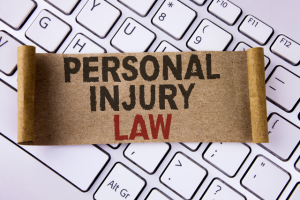The Process of a Personal Injury Case
 How does a personal injury lawsuit differ from other cases? For starters, personal injury lawsuits are legal disputes that arise when one person is injured due to the negligence or recklessness of someone else. The charges are civil and compensation-based, rather criminal and sentence-based. Finally, in most cases, the personal injury process ends in a settlement.
How does a personal injury lawsuit differ from other cases? For starters, personal injury lawsuits are legal disputes that arise when one person is injured due to the negligence or recklessness of someone else. The charges are civil and compensation-based, rather criminal and sentence-based. Finally, in most cases, the personal injury process ends in a settlement.
A personal injury lawsuit begins when a private individual (known as the plaintiff) files a civil complaint against another individual, corporation, business, or agency (known as the defendant). In this complaint, the plaintiff alleges the defendant acted carelessly or recklessly, resulting in an accident or injury.
You should never file a complaint without the assistance of an experienced personal injury attorney. Your attorney will communicate with insurance companies, negotiate a settlement, and guide you through the personal injury process as seamlessly as possible.
At Dennis A. Lopez & Associates, our dedicated lawyers have more than 30 years of experience in personal injury law. To learn more, contact our office at (877)-333-3676 for a free consultation.
Step 1: Meeting Your Attorney
After you’ve been injured in an accident, you need to speak to an experienced team of attorneys about the circumstances surrounding your case. This includes whether negligence was involved, the extent of your injuries, and your medical expenses. At this point, your lawyer will outline your legal options.
Step 2: Investigating Your Case
Once you’ve chosen to retain a lawyer, you’ll need to allow an investigation of your personal injury claim to proceed. This will include police reports, photographs, testimony from witnesses, medical expenses and records, your employment history, your earning power, and much more. It’s important to set aside all documentation you receive throughout the personal injury process.
Step 3: Establishing a Demand Package
After the investigation is complete, you’ll work closely with your attorney to develop a demand letter outlining your case. This will include the amount you expect to receive as compensation for your injuries, medical bills, lost wages, pain and suffering, and future medical care – among other things. This letter will be reviewed by the potential defendant, who will make a counteroffer, reject your demand outright, or accept it. This is perhaps the most important impression you’ll make on the potential defendant, so focus on putting together a quality letter that showcases your confidence.
Step 4: Filing a Lawsuit
If you are unable to reach a settlement with the potential defendant, the time has come in the personal injury process to file an official lawsuit seeing compensation.
From this moment until your official trial date, you may still negotiate a settlement with the defending party. You are not, under any circumstances, required to accept a settlement offer made by the defendant. Your attorney will provide honest and useful advice throughout this process. If you fear the courtroom, don’t worry. The vast majority of personal injury lawsuits are settled before reaching their trial date.
Step 5: Discovery
Before going to trial, both parties will obtain further evidence in order to evaluate the effectiveness of the other side’s case. The more you learn, the more prepared you’ll be.
Step 6: Mediation
Both sides may choose to visit a mediator, who is responsible for overseeing mediation between the parties in an attempt to avoid a trial – which is often more expensive for everyone involved. Mediation is an informal proceeding but can have long-lasting effects on the case. Never go into mediation without an experienced attorney by your side.
Step 7: Trial
If you still haven’t reached an understanding with the defendant through settlement or mediation, the time has come to make your case in front of a jury. The panel of jurists will evaluate the facts presented in court, determine fault, and award damages. Sometimes, a judge will determine exactly how much compensation should be awarded to the plaintiff. When plaintiffs receive an unfavorable ruling, they may choose to appeal their case through the appellate court system. This differs significantly from preparing a trial case. We suggest leaning on your attorney for advice and representation during this phase of the personal injury process.
Contact an Experienced Personal Injury Attorney for Representation
In the state of Florida, you have four years to file a personal injury lawsuit after suffering an injury due to the negligence or reckless of another individual, business, or agency. If you miss this deadline, you can never receive compensation for your injuries.
Contact our personal injury attorney team at Dennis A. Lopez & Associates for assistance and representation by calling (877)-333-3676. Our team is fully dedicated to fighting for the compensation you deserve.
